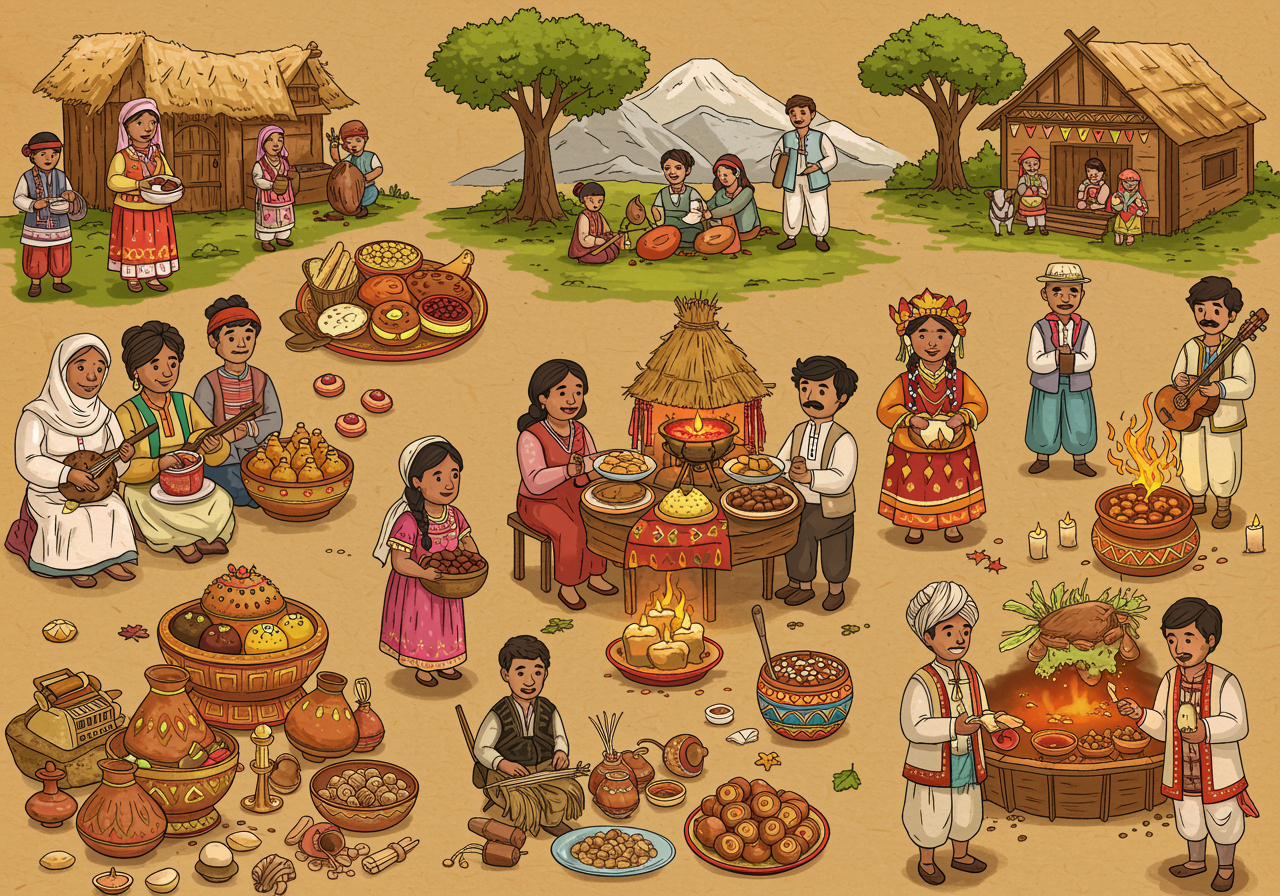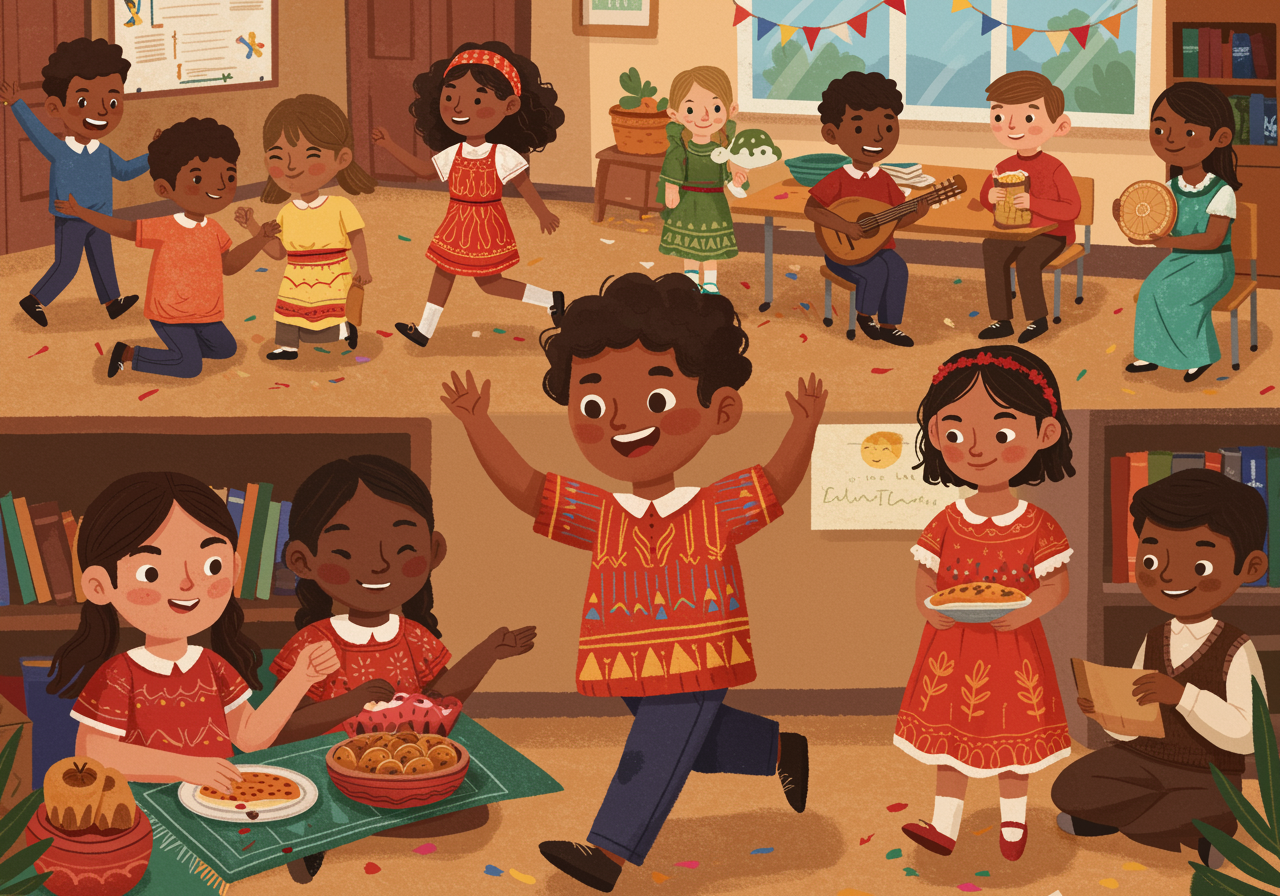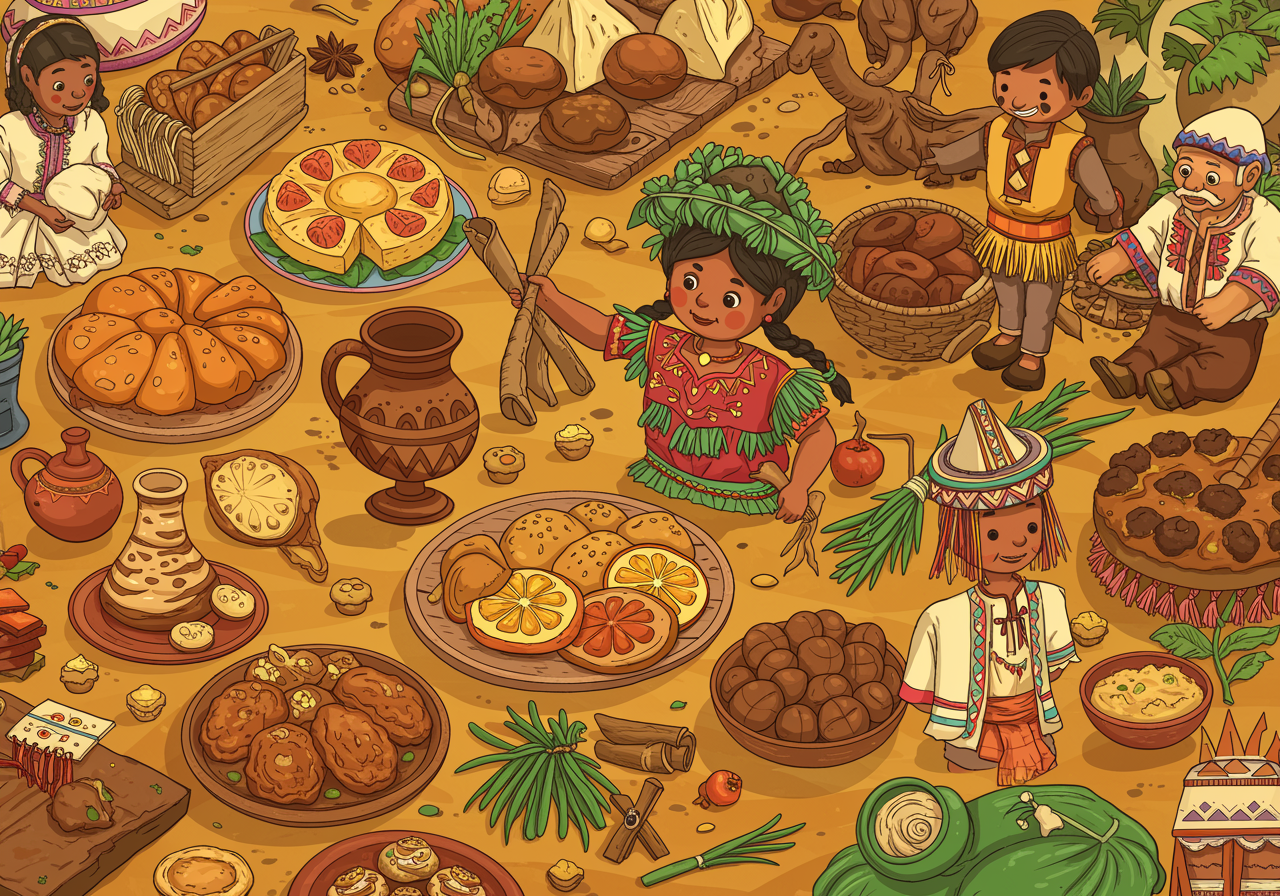The Amazing Recipe Book of Human Culture

Why Every Culture Cooks Up Their Own Special Traditions
Discover how cultures around the world create unique traditions that shape everything from what we eat to how we celebrate, and why these differences make our world more colorful and connected.
Overview
Think about your family's favorite holiday traditions or the special foods you eat together. Every culture around the world has developed their own unique 'recipes' for living – from celebrations and ceremonies to daily habits and values. These traditions aren't just fun activities; they're like invisible threads that weave communities together and help people understand who they are and where they belong. Understanding why cultures create different traditions helps kids appreciate diversity, develop empathy, and see how our interconnected world is both beautifully different and surprisingly similar.

Understand in 30 Seconds
Get up to speed quickly
- Geography Shapes Traditions: People who live near oceans often have fish-centered celebrations, while mountain communities might celebrate harvest seasons. Where you live affects what traditions make sense for your community.
- History Creates Stories: Major events in a culture's past become the foundation for traditions. A great victory might become an annual celebration, while overcoming hardship might create rituals of gratitude.
- Values Get Passed Down: Traditions are like time capsules that carry important messages about what a culture values most – family, respect, courage, or community spirit.
- Traditions Evolve and Spread: As people move and cultures mix, traditions change and travel. That's why you might celebrate traditions that started thousands of miles away from where you live now.
Real Life Scenario
Situations you can relate to
Imagine you're starting a brand new school on a remote island with kids from all over the world. How would you decide what holidays to celebrate? The students from cold climates might want a winter festival with warm foods and cozy gatherings, while kids from tropical places might prefer summer celebrations with water activities. Students whose families faced difficult times might want traditions that honor perseverance, while others might focus on gratitude traditions. Over time, your school would probably create its own unique mix – maybe a winter festival with tropical fruits, or a gratitude celebration that includes activities from many cultures. This is exactly how real cultures develop their traditions!

Role Play
Spark a conversation with “what if” scenarios
What if your family had to create a brand new holiday tradition?
- Role play: Work together to design a family holiday. Decide what values you want to celebrate, what foods you'd eat, what activities you'd do, and what story you'd tell future generations about why this tradition matters.
What if you could time travel and experience any cultural tradition?
- Role play: Take turns being a 'cultural ambassador' who describes and acts out a tradition from a culture you're curious about. The other person asks questions about why that tradition might be important to that community.
What if you had to explain your favorite family tradition to someone from another planet?
- Role play: Practice describing a family tradition without using any cultural assumptions. Focus on the feelings, values, and reasons behind the tradition rather than just the actions.
FAQs
Frequently asked questions people want to know
Why do some traditions seem weird or strange to me?
What seems normal depends on what you grew up with! Every tradition makes perfect sense within its own culture's history and values. It's like how different families might have totally different bedtime routines – they all work, just differently.
Can traditions change, or do they have to stay the same forever?
Traditions are always evolving! Even traditions that seem ancient have changed over time. The core meaning usually stays the same, but how people practice them adapts to new circumstances and generations.
Why is it important to learn about other cultures' traditions?
Understanding other traditions helps you understand other people better. It also shows you different solutions to universal human needs like celebrating, grieving, marking important moments, and building community.
Examples in the Wild
See how this works day to day
- Día de los Muertos (Day of the Dead) celebrations have spread from Mexico to cities worldwide, showing how traditions can cross borders while keeping their core meaning of honoring deceased loved ones. (National Geographic Society)
- Korean pop culture has introduced global audiences to traditions like Chuseok (harvest festival) and the importance of respect for elders, influencing how young people worldwide think about family relationships. (Smithsonian Institution)
- The tradition of afternoon tea in England influenced social customs in former British colonies, but each place adapted it – adding local foods, timing, and customs to make it their own. (BBC Culture)
- Indigenous land acknowledgments before public events are becoming common practice in many countries, showing how ancient traditions can find new relevance in modern society. (UNESCO)
In Summary
What you should know before you start
- Cultures develop unique traditions based on their geography, history, and values
- Traditions serve important purposes like building community, teaching values, and marking important life events
- Understanding different traditions helps us appreciate diversity and find common ground with others
- Traditions evolve over time and often blend with other cultures as people move and interact
Pro-tip for Parents
You got this!
If your child seems judgmental about unfamiliar traditions, try the 'curious detective' approach. Instead of saying 'don't judge,' ask questions together like 'What problem might this tradition solve?' or 'What would make this meaningful to the people who practice it?' This shifts the conversation from judgment to genuine curiosity and understanding.

Keep an Eye Out For
Find these examples in everyday life
- Cultural festivals in your community where you can experience traditions firsthand
- News stories about how holidays or traditions are being adapted in modern times
- Movies, books, or shows that feature cultural traditions different from your own
- Opportunities to talk with classmates, neighbors, or coworkers about their family traditions
Explore Beyond
Look up these related research topics
- How immigration and global communication change cultural traditions
- The role of food in different cultures and why certain dishes become traditional
- How religions and belief systems influence cultural practices
- Why some traditions disappear while others survive for thousands of years